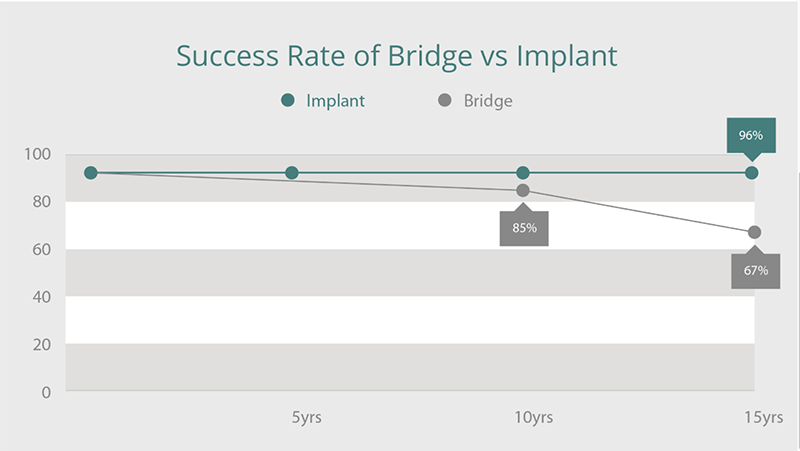
If you’re considering dental implants, we know there’s one big question on your mind: are they worth it?
There are a few things to know when approaching implants for the first time. One – the process is going to be unlike anything you’ve experienced. And two – so are the results.
There are positive and negative connotations to both those statements. Yes, implants require a more involved placement and planning process. But the long-term results and longevity of the restorations make them worth your while.
We’ve put together some statistics and expert advice on how successful implants typically are – and we’re here to answer any questions you might have about your own implant candidacy. Get in touch to learn more from Dr. Barton and our team.
Dental Implant Success Rates

Photo courtesy of The Dental Implant Guide
Dental implants are embedded in the jaw bone. Once in place, those implants integrate with the bone tissue and form a strong bond with the jaw structure. It’s this period of integration that determines how successful the implant is, and how long it lasts.
Implants are made of titanium, which bonds the bone tissue. Ongoing technological improvements to implants have helped increase success rates while reducing the necessary healing time.
Potential implant patients should know the following:
- Implants are designed to last – Implants are intended to last for the patient’s lifetime. This is very different from other restorations, which are not as long-lasting.
- Other restorative options have shorter lifespans – Bridges and partials can’t compete with implants’ longevity. The ADA states that the average period of time a bridge lasts is slightly over 10 years. This is mainly due to the adjacent teeth weakening as the bridge saps their strength. If the bridge is replacing more than one tooth, filling in a larger gap, its success rate is lower. These teeth are vulnerable and are likely to become decayed or fractured. Removable partial dentures have an even shorter lifespan, lasting just 3-5 years and often needing to be relined as bone tissue in the area resorbs.
- Implants are 95%-98% successful for 40-50 years – Multiple studies have shown that implants meet this high success rate. Conditions that impact the life of the implants include the patient’s health, the availability of bone tissue, and the number of teeth being replaced (as well as the type of accompanying restorations).
If you’ve been considering an implant versus a bridge or partial, know that the implant is going to provide longer-time tooth replacement. It is often going to be more beneficial to put individual crowns and dental implants on teeth than to replace single teeth with a bridge. This is because it’s always important to protect the adjacent teeth.
Some other useful facts about implants vs. other restorative options include:
- Implant success rates do not decrease over time
- Bridge success rates do decrease over time, after the first 10 years
- 15 years out, 1 in 3 bridges typically fails
- Bridge success rates decrease even further if the bridge is supported by teeth that have had root canals
- Implants typically offer fewer complications than bridges
Dental Implants & Periodontal Disease
Of course, implants aren’t ideal for every patient. You will need to have adequate bone density in the treatment area to see success. It is also important that your teeth and gums are healthy. If you have periodontal disease, there is a risk of peri-implantitis. This can interfere with the integration of the implant and the jaw bone. Complications can follow, ranging from bone loss to loss of the implant.
If you have gum disease, that doesn’t mean you can’t receive implants. But you will need to treat existing disease before you begin the implant process. Dr. Barton will help you move past periodontitis and prepare for implants.
How To Ensure Your Implants Last
Like we mentioned earlier, there are a few ways to ensure your dental implants stay with you for life. Making sure to follow these tips will help you maintain implants in the long term:
- How well you care for your implants – Be sure to brush and floss daily and treat your implants with care.
- Regular exams – You should visit your dentist every six months to ensure that your implants are healing properly and there are no other problems present.
- Never using your teeth as tools – Do not open things with your teeth, bite non-food items like pens or your nails, or otherwise abuse your teeth.
- Your lifestyle – Get a healthy diet, avoid tobacco and take care of yourself.
While you should schedule dental exams twice yearly (or potentially more often if you are at a higher risk of gum disease), you should also get in touch with your dentist right away if you notice any of the below symptoms. These indicate that there may be an infection around your implant –
- Loose-feeling implant
- Numbness or tingling in your gums, chin, lips or surrounding teeth
- Pressure on the implant
- Sinus problems
- Inflammation of the gums around your implant
Dalton Dental Implants | Implant Dentist Dalton | Dental Implants Dalton






